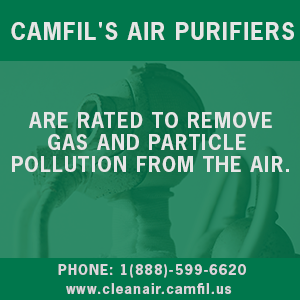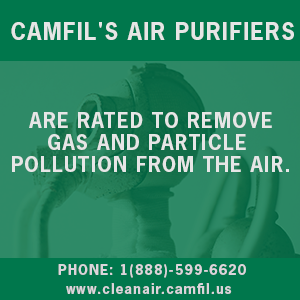Clean Air Solution by Camfil USA. Leader in Air Filters for Commercial and Industrial applications.
Studies have found that people living near an airport can experience a higher rate of respiratory problems due to elevated airplane emissions that contain hazardous contaminants.
Recent studies have found that living near an airport could be hazardous to your health.
One air quality study found that neighborhoods as far as 10 miles away from Los Angeles International Airport (LAX) are contaminated with high levels of ultrafine particles that can easily be swallowed or inhaled. These particles are hazardous to human health because they can penetrate in to the lungs and into breathing passages and worsen asthma symptoms, as well as lead to decreased lung function and impair cognitive ability in children.
Researchers have known for years that the exhaust from aircraft contains ultrafine particles that are harmful to human health. But a growing body of studies is finding that far from just being contained within a small area, airport pollution can spread much further out than previously thought, and cause real health problems in residential areas where people are unaware of the risk. This is an issue that affects everyone concerned about the quality of air where they live.
Airport Pollution Facts
To fully understand this issue, it’s important to detail some airport pollution facts.
According to the Los Angeles Times, aircraft exhaust is the main source of airport pollution at major urban areas in the U.S. The reason is that scorching exhaust vapor from airplanes creates ultrafine particles, which can worsen lung and heart conditions, aggravate bronchitis and emphysema, and even lead to blocked arteries. (1)
These ultrafine particles are, “less than one-thousandth the width of a human hair [and] they can go deep in the lungs, make their way into the bloodstream and spread to the brain, heart and other critical organs. While emissions of slightly larger exhaust particles are regulated, ultrafine particles are not.”
Therefore, the majority of airborne pollutants generated by aircraft exhaust are not regulated by the U.S. Environmental Protection Agency (EPA), which is of great concern, because of the number of major airports throughout the U.S.
Another source of concern is the LAX study, which found that neighborhoods as far as 10 miles away from the airport had elevated particle levels due to airport emissions.
And the level of pollution at LAX was equivalent to the emissions generated by nearly 500 vehicles stalled in freeway traffic every day.
What’s worse is that researchers have also detected other harmful pollutants in and around airports, such as nitrogen oxide – which creates smog – and black carbon, “a major component of soot found in engine exhaust.”
And it’s not just major airports that are a risk because the American Chemical Society reported that emissions from regional airports were “significantly elevated when compared to background pollution levels.” (2)
Controlling Airport Related Pollution
Given these facts, controlling airport related pollution is vital to preventing the health problems caused by the dispersion of ultrafine particles into the atmosphere.
Some airports have acted on their own and implemented new policies in an effort to reduce emission levels.
According to Enviro Aero, some airports provide electric power and air supplies at terminal gates, which allows pilots to turn off auxiliary power in aircrafts, “reducing fuel burn and pollutants.” (3)
Other airports have tried to shrink the amount of time that airplanes taxi on the runway waiting for a gate to open.
In addition, some airports have begun tackling the problem of emissions generated by vehicles used on the tarmac. They are exploring the effectiveness of alternative fuels, including liquid petroleum gas and compressed natural gas that have less harmful emissions than diesel and gasoline.
“Lowering the rate of pollution at airports is a difficult task,” stated Kevin Wood, Camfil USA Vice President Sales & Marketing. “It will require a change of mindset by airport officials in terms of how they manage aircraft on the runway. For example, an airport in Minnesota now requires airplanes to remain at cruising altitude for a longer period of time before they approach the airport. As a result, planes burn less fuel and emit less carbon dioxide.”
And as mentioned earlier, this isn’t just an issue for airports but is vital for people living near an airport who are being harmed by the level of pollution generated by planes that take off and land each day.
Airport Pollution Prevention
If you live near an airport, you can take steps to help improve the quality of the air you breathe. First, recognize that you spend most of your time indoors; so indoor air quality is vital to your health. Second, invest in an air purifier that is rated to remove gas and particle pollution from the air. Third, make sure that you install air filters in your HVAC system that can trap the common pollutants generated by airport emissions.
Camfil is also one of the most global air filtration specialists in the world with 26 production units and R&D centers in four countries in the Americas, Europe, South East Asia and the Asia-Pacific region. Backed by over 50 years of experience and innovation, every Camfil product is designed to provide high-efficiency air filtration, low energy consumption, and a healthier environment. Camfil has a solution that is right for you.

Other Resources for you
- Learn about how an airport in Minnesota is trying to tackle air quality in our Previous blog post
- Read our blog post: The quality of the air you may be breathing on your next flight.
Lynne Laake
Camfil USA Air Filters
T: 888.599.6620
E: Lynne.Laake@camfil.com
F: Friend Camfil USA on Facebook
T: Follow Camfil USA on Twitter
Y: Watch Camfil Videos on YouTube
SOURCES
- http://touch.latimes.com/#section/-1/article/p2p-80340444/
- https://www.acs.org/content/acs/en/pressroom/presspacs/2009/acs-presspac-november-18-2009/hidden-threat-elevated-pollution-levels-near-regional-airports.html
- https://aviationbenefits.org/environmental-efficiency/local-air-quality/
The post Living Near an Airport Could Be a Matter Of Life And Death appeared first on Air Filters for Clean Air.

